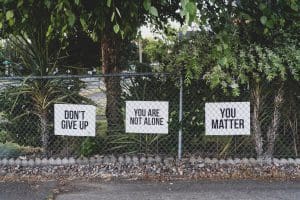Taking the First Step: Deciding to Seek Professional Help
The process of going from experiencing symptoms of impacted mental health to getting the treatment you need is a unique journey that takes everyone on a different path. Personally, seeking professional help didn’t seem like a viable option for years after I knew I was suffering from a mental illness that was making my day-to-day life miserable.
I started experiencing symptoms of depression around 10 years old, and I’ve had anxiety for as long as I can remember. Being that I was in middle school when my depression began, I did not have the ability or vocabulary to properly articulate my feelings or what was going on in my head. Similarly for my anxiety, I didn’t know how to describe a panic attack or anxious thoughts, so I just thought that’s how everyone must feel. Also, there were a lot of external stressors from my family, and they did not understand mental health, so I felt even more alone since you were supposed to be able to turn to your parents for anything.
 Fast forward a few years, my anxiety felt like a ball and chain and started hindering my ability to socialize and do other tasks that would require me to bring any attention to myself. At this point, I knew this wasn’t the norm for everyone, there was something different going on inside my head that my friends did not relate to or understand. I was now old enough to verbalize what was happening and as soon as I confided in my friends, they told me to “just chill out, everything is fine. There’s no reason to get yourself worked up over nothing”. While they technically were not wrong, it still didn’t feel great to hear. And after all, that is where the “illness” part of “mental illness” comes in, it’s not something you have control over; your brain is wired differently or there is a chemical imbalance that is causing these symptoms. That’s not to discredit actual coping mechanisms I have learned through Cognitive Behavior Therapy (CBT), but hearing your best friends essentially tell you to “get over it” was not constructive. This experience was pretty negative and so I stopped confiding in my peers about what was going on. I then turned to the Internet and decided I was going to “fix” myself. I am an engineer and have always viewed problems with a scientific mindset; if I could understand what was going on in my head, I thought I would be better equipped to handle it myself. I was wrong; I only ended up self-diagnosing myself with a list of disorders that, upon reading the description and symptoms, said “Oh yeah, I definitely have that.” This was also not constructive, since I now thought that there was everything wrong with me.
Fast forward a few years, my anxiety felt like a ball and chain and started hindering my ability to socialize and do other tasks that would require me to bring any attention to myself. At this point, I knew this wasn’t the norm for everyone, there was something different going on inside my head that my friends did not relate to or understand. I was now old enough to verbalize what was happening and as soon as I confided in my friends, they told me to “just chill out, everything is fine. There’s no reason to get yourself worked up over nothing”. While they technically were not wrong, it still didn’t feel great to hear. And after all, that is where the “illness” part of “mental illness” comes in, it’s not something you have control over; your brain is wired differently or there is a chemical imbalance that is causing these symptoms. That’s not to discredit actual coping mechanisms I have learned through Cognitive Behavior Therapy (CBT), but hearing your best friends essentially tell you to “get over it” was not constructive. This experience was pretty negative and so I stopped confiding in my peers about what was going on. I then turned to the Internet and decided I was going to “fix” myself. I am an engineer and have always viewed problems with a scientific mindset; if I could understand what was going on in my head, I thought I would be better equipped to handle it myself. I was wrong; I only ended up self-diagnosing myself with a list of disorders that, upon reading the description and symptoms, said “Oh yeah, I definitely have that.” This was also not constructive, since I now thought that there was everything wrong with me.
Fast forward to college, I had such an amazing experience my freshman year that my depression was no longer a major bump in the road for me, but my anxiety was worse than ever. In my sophomore year, I was living in a single apartment where I was not surrounded by friends and social opportunities everywhere and my depression came back in full force. I was now 20 years old and had been fighting depression and anxiety for more than half of my life and had had enough; it was time for a real professional to assess and help me. I started by speaking to my primary care physician about what was going on and they started me on Zoloft. I then met with her every 4 weeks for a check-in. I thought these appointments were therapy sessions, but they were actually just to see how the meds were helping since she was a psychiatrist, not a therapist. We then decided that it would be best for me to seek out a therapist. Finding my therapist was a whole process in and of itself, but after one session with him, I knew this was what I was supposed to be doing for the past 10 years.
 As I said, everyone’s path to treatment is different, and this was a condensed version of mine. One of the most important parts of this process is deciding which treatment options are best for you, whether that be therapy, medication, or a combination of both. Therapy is usually a safe first step, and often they are well-equipped to assess if medication is a good option for you. Finding a therapist can also be difficult, but there are plenty of resources online to help with this process. This link is a therapist search engine where you can filter by specialists, therapy style, insurances they accept, etc. There are plenty of similar websites out there that can be found with a simple google search. The most important part of this whole process is pushing through the roadblocks and obstacles because no matter how discouraged you may feel, this is one of the most important things you will ever do for yourself.
As I said, everyone’s path to treatment is different, and this was a condensed version of mine. One of the most important parts of this process is deciding which treatment options are best for you, whether that be therapy, medication, or a combination of both. Therapy is usually a safe first step, and often they are well-equipped to assess if medication is a good option for you. Finding a therapist can also be difficult, but there are plenty of resources online to help with this process. This link is a therapist search engine where you can filter by specialists, therapy style, insurances they accept, etc. There are plenty of similar websites out there that can be found with a simple google search. The most important part of this whole process is pushing through the roadblocks and obstacles because no matter how discouraged you may feel, this is one of the most important things you will ever do for yourself.
Are you currently seeking any treatment to support your mental health? If so, what made you seek it out? How did others around you react when you were experiencing symptoms for the first time and tried to talk to them about it?





Recent Comments